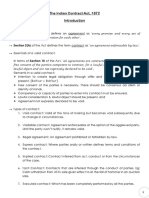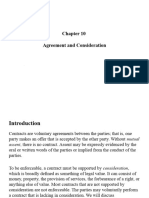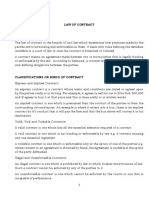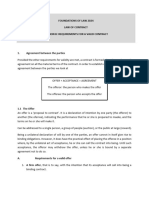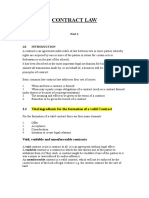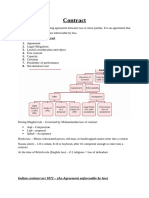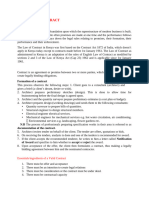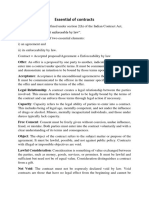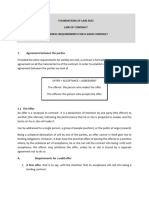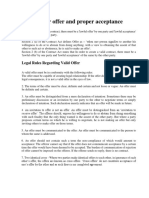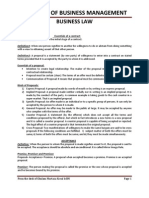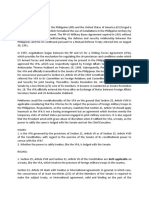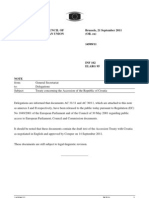Meaning and Definition of Offer and Acceptance
Meaning and Definition of Offer and Acceptance
Uploaded by
yugeshCopyright:
Available Formats
Meaning and Definition of Offer and Acceptance
Meaning and Definition of Offer and Acceptance
Uploaded by
yugeshOriginal Title
Copyright
Available Formats
Share this document
Did you find this document useful?
Is this content inappropriate?
Copyright:
Available Formats
Meaning and Definition of Offer and Acceptance
Meaning and Definition of Offer and Acceptance
Uploaded by
yugeshCopyright:
Available Formats
Question 1.
In relation to the formation of a valid contract explain the meaning of an offer and
acceptance with definition; describe any FOUR (4) circumstances under which an offer may be
terminated. 1000
Answer:
A contract is an assentation enforceable by law. The law of contract is the premise of commerce.
Each trade action is decided and guided by the understanding of the concerned parties. In reality,
the law of contract is concerned with everyone and each perspective of the trade to perform any
kind of act. And it is concerned with the rights and commitment of the parties entering into it.
Supreme Court of Nepal defines contract as, “An agreement of two or more parties with
condition of contract”.
Meaning and definition of Offer and Acceptance:
Offer means to give or ask something in order that it should be accepted or rejected. It is
basically the proposal of the first party to another party. Offer is the fundamental aspect of any
contract. If a person or institution signifies willingness to do or not to do something with an
expectation of obtaining an assent of that person or institution then it is known an offer.
Offeror is the person who make the offer and offeree is the person to whom the contract was
made.
Offer the kind of proposal forwarded by one party to another that is related to do or not to do any
work or activity willing to enter into a bargain.
Section 504(3) (1) of the Civil Code, 2074 defines the term as, “Offer means an offer made by
one person to another person with the intent of obtaining his or her acceptance to do or abstain
from doing any act.”
Richard, “An offer is an expression of willingness to contract on certain terms made with the
intention that a binding agreement will exist once that offer is accepted.
Example:- Sales of good Contract
The buyer promises to pay the price of goods or services
The seller promises to deliver the goods or services.
Acceptance is outlined as the consent or assent signifying to the offer. It is simply an act of
expressing assent of an offer by any person or institution. It is the final result in which final offer
creates a contractual relationship between the parties that is bounded by contractual rights and
obligations.
It is manifestation by offeree of his willingness to be bound by the terms of offer which is an
assent given for the proposal made by the offerer.
Section 504(3) (2) of the Civil Code, 2074 defines acceptance as “Acceptance means the
acceptance given by the person to whom the offer has been made in the same meaning in which
the offer is made.”
An offer is terminated in the following circumstances.
i. Revocation: - Revocation is the situation in which an offer is withdrawn by the offerer.
Offer can revoke at any time before acceptance takes place. But, before acceptance the
revocation should be communicated effectively to offeree . This communication is not
necessary to be made personally rather can be communicated via mail, post, telegram, etc.
If the offeree accepts the offer by post, namely letter, the postal policy / rule would strictly
apply and would not permit to withdrawal. Contrary, once the offer is accepted and acted
upon, it cannot be revoked, this would be considered as incompliance or it would be
considered as a breach of contact.
ii. Rejection: - This is the situation when the offer is refused by the offeree. Rejection is
effective only when it is received by the offeror or Offeror’s agent. A counteroffer by the
Offeree is the rejection of the original offer and making of a new offer.
iii. Conditional Offer: - An offer which explicitly gives that it is to end on the event of a few
condition cannot be acknowledged after that condition has happened; and such a
arrangement may moreover be suggested. In other words, end of an offer may too happen
due to a condition not being met. For case, the offer was made in a suggested condition, to
be specific the car keeping up in its undamaged state may be a conditional point of
reference. Since the car was stolen from the merchants and harmed, the offer was ended
when the condition comes up short and got to be unfit of being acknowledged.
iv. Death: - The death of either the offeror or the offeree will cause such end: the proper
to accept an standard offer isn't transferable. The unaccepted offer of a expired
individual cannot be changed over into a contract official upon his estate.
You might also like
- Bargaining For Advantage Free Summary by G. Richard ShellDocument8 pagesBargaining For Advantage Free Summary by G. Richard Shellohsomaya_798528883No ratings yet
- Imp Questions ContractDocument18 pagesImp Questions ContractNishantverma100% (10)
- International LawDocument163 pagesInternational LawEdwin Villa100% (1)
- YPLF Moot Court Competition ProblemDocument27 pagesYPLF Moot Court Competition ProblemDorgham AbusalimNo ratings yet
- Memorandum of UnderstandingDocument4 pagesMemorandum of UnderstandingDeepesh Mittal100% (1)
- Not One Inch EastwardDocument23 pagesNot One Inch EastwardTonyCalUSM100% (1)
- The Indian Contract Act, 1872Document12 pagesThe Indian Contract Act, 1872Avinash ChandranNo ratings yet
- Reason in Support: The Terms of The Agreement Must Be Possible For PerformanceDocument5 pagesReason in Support: The Terms of The Agreement Must Be Possible For PerformanceVidushi ThapliyalNo ratings yet
- L3 - Transcript200314101003034848Document8 pagesL3 - Transcript200314101003034848Pritesh KashyapNo ratings yet
- LawDocument14 pagesLawamitkumarmehta2015No ratings yet
- Definition of Valid AcceptanceDocument2 pagesDefinition of Valid Acceptancecmramar100% (1)
- MGMT 260 CH 10 SlidesDocument21 pagesMGMT 260 CH 10 SlidesqhaweseithNo ratings yet
- Offer and Acceptance ProjectDocument14 pagesOffer and Acceptance ProjectAnOkhii LaDlii0% (1)
- Points:: Indian Contract Act, 1872Document25 pagesPoints:: Indian Contract Act, 1872Neeraj ChhabraNo ratings yet
- EACR 2213 - Law of ContractsDocument42 pagesEACR 2213 - Law of Contractsmaisodavidson52No ratings yet
- FinaleDocument38 pagesFinaleAzmansah Bangsa Dadung GigurNo ratings yet
- Different Contracts in Legal Aspect of BankingDocument7 pagesDifferent Contracts in Legal Aspect of Bankingdrishya3No ratings yet
- Indian Contract Act, 1872Document18 pagesIndian Contract Act, 1872angeelinaNo ratings yet
- Elements of ContractDocument6 pagesElements of ContractJerome ArañezNo ratings yet
- Introduction To Law Notes 1-5Document9 pagesIntroduction To Law Notes 1-5uyapomugabeNo ratings yet
- 9 Valid Conditions That Constitutes A Valid OfferDocument15 pages9 Valid Conditions That Constitutes A Valid OfferMuhammad ArslanNo ratings yet
- Offer and AcceptanceDocument5 pagesOffer and AcceptancePrithvi NathNo ratings yet
- Presentation1FORMATION OF A CONTRACTS OFFERDocument30 pagesPresentation1FORMATION OF A CONTRACTS OFFERDAWA JAMES GASSIM100% (2)
- Law of ContractDocument27 pagesLaw of ContractSam Kariuki100% (1)
- Contract-Section B 2024Document18 pagesContract-Section B 2024basheeragoolam5No ratings yet
- AcceptanceDocument5 pagesAcceptanceOngwang KonyakNo ratings yet
- Essentials of An AcceptanceDocument4 pagesEssentials of An AcceptancePratik ThakerNo ratings yet
- Business Law-Contract Essentials-Class 2Document21 pagesBusiness Law-Contract Essentials-Class 2makNo ratings yet
- All Contracts Are AgreementDocument13 pagesAll Contracts Are AgreementAzizi JaisNo ratings yet
- Contract ActDocument18 pagesContract ActDeepak TongliNo ratings yet
- Review Notes-Art 1321-1350-JoyceDocument28 pagesReview Notes-Art 1321-1350-Joycebinanfirestation100% (1)
- Group 6 PDFDocument71 pagesGroup 6 PDFIGNACIO, JAYSON G. - OANo ratings yet
- Indian Contract Act 1872Document5 pagesIndian Contract Act 1872Satyanayan RudrashettyNo ratings yet
- 3 Contract LawDocument27 pages3 Contract LawConstantin LazarNo ratings yet
- Offer, Revocation, AcceptanceDocument5 pagesOffer, Revocation, AcceptanceMohsin AliNo ratings yet
- Contract - Unit 1Document10 pagesContract - Unit 1shields hyperNo ratings yet
- BRF Notes (2) Finance and TaxationDocument26 pagesBRF Notes (2) Finance and Taxationhisarahhh4No ratings yet
- The Law of Contract (1) - 1Document19 pagesThe Law of Contract (1) - 1kisilusamuel63No ratings yet
- ContractsDocument9 pagesContractsTIMEPASSNo ratings yet
- Contract LawDocument10 pagesContract LawelormNo ratings yet
- Business Law Chap. TwoDocument74 pagesBusiness Law Chap. TwoSamiya MaxamuudNo ratings yet
- OfferDocument7 pagesOfferekagrataNo ratings yet
- ConsentDocument14 pagesConsentChristian Jaylord TomasNo ratings yet
- Supriya Murmu (CA1) - MB 103Document6 pagesSupriya Murmu (CA1) - MB 103murmusupriya1818No ratings yet
- Indian Contract Act, 1872Document44 pagesIndian Contract Act, 1872Minhaz Iqbal HazarikaNo ratings yet
- Indian Contract Act-John.V.SugumaranDocument47 pagesIndian Contract Act-John.V.Sugumaranjv_suguNo ratings yet
- Legal Issues Chapter 2Document8 pagesLegal Issues Chapter 2sdfghjkNo ratings yet
- Offer and Acceptance: BY Prof - Sujir PrabhakarDocument12 pagesOffer and Acceptance: BY Prof - Sujir PrabhakarArun KumarNo ratings yet
- The Indian Contract ActDocument15 pagesThe Indian Contract Actvasantha mulpuriNo ratings yet
- Law of Contract - DIPDocument7 pagesLaw of Contract - DIP9v79mb29c2No ratings yet
- Contract Part 2 Requirements 2023Document19 pagesContract Part 2 Requirements 2023karabomohlabaneNo ratings yet
- Essentials of Contract ProjectDocument17 pagesEssentials of Contract ProjectAeshana SinghNo ratings yet
- Legal Environment of Business in Bangladesh.. Till Ch. 8Document16 pagesLegal Environment of Business in Bangladesh.. Till Ch. 8Rabiul Hasan Bin AnwarNo ratings yet
- Unit I NotesDocument16 pagesUnit I Notesmn nandaniNo ratings yet
- Institute of Business ManagementDocument5 pagesInstitute of Business ManagementSunil KumarNo ratings yet
- ContractsDocument23 pagesContractsUnarine MuvhusiNo ratings yet
- Contract Law NotesDocument33 pagesContract Law NotesDrishti TiwariNo ratings yet
- Offer and AcceptanceDocument5 pagesOffer and AcceptancePonnilavan SibiNo ratings yet
- Void and Voidable ContractDocument10 pagesVoid and Voidable ContractSupriya BajracharyaNo ratings yet
- Contract Law FinalDocument45 pagesContract Law FinalShivam MishraNo ratings yet
- 2.1 Offer: INDIAN CONTRACT ACT 1872: OFFER Business RegulationsDocument3 pages2.1 Offer: INDIAN CONTRACT ACT 1872: OFFER Business Regulationskarthik karthikNo ratings yet
- Contract Law (1) Notes For LLB - HonsDocument22 pagesContract Law (1) Notes For LLB - HonsemanNo ratings yet
- Project Work Law of ContractDocument11 pagesProject Work Law of ContractSãéèďNo ratings yet
- Life, Accident and Health Insurance in the United StatesFrom EverandLife, Accident and Health Insurance in the United StatesRating: 5 out of 5 stars5/5 (1)
- April 9 Regular City Council MeetingDocument2 pagesApril 9 Regular City Council MeetingThe Brookhaven PostNo ratings yet
- Pil Cases 1591317Document7 pagesPil Cases 1591317Reino CabitacNo ratings yet
- AlbanianLife 24 1983 OCR SMDocument52 pagesAlbanianLife 24 1983 OCR SMab theproNo ratings yet
- The Treaty of ParisDocument11 pagesThe Treaty of ParisbryanNo ratings yet
- Instruction: Fill Up The Information For This Table As Completely As Possible, Indicating The Legal Basis For Your AnswersDocument1 pageInstruction: Fill Up The Information For This Table As Completely As Possible, Indicating The Legal Basis For Your AnswersAngelica BautistaNo ratings yet
- Film Producers AgreementDocument2 pagesFilm Producers AgreementDev ParmarNo ratings yet
- Exam in ObliconDocument17 pagesExam in ObliconAiziel OrenseNo ratings yet
- International Trade - Copy For MailDocument18 pagesInternational Trade - Copy For MailIqra ZahidNo ratings yet
- Sai Srijan NetiDocument15 pagesSai Srijan NetiNivesh DixitNo ratings yet
- Force Majeure Clauses Checklist Sample Wording enDocument7 pagesForce Majeure Clauses Checklist Sample Wording enJasonafarrellNo ratings yet
- Test Bank For Perspectives On International Relations Power Institutions and Ideas 7th Edition Henry R NauDocument22 pagesTest Bank For Perspectives On International Relations Power Institutions and Ideas 7th Edition Henry R Naujasonwrightjsfaxizewq100% (37)
- McGill GuideDocument50 pagesMcGill GuideanarNo ratings yet
- Nacrt Pristupnog UgovoraDocument403 pagesNacrt Pristupnog UgovoraSergej IvasovićNo ratings yet
- Consti CasesDocument150 pagesConsti CasesJil MacasaetNo ratings yet
- Commissioner of Internal Revenue v. SC Johnson & Son, Inc.: Topic: TaxationDocument2 pagesCommissioner of Internal Revenue v. SC Johnson & Son, Inc.: Topic: TaxationdelayinggratificationNo ratings yet
- Shengen Visa DetailsDocument17 pagesShengen Visa DetailshugocorzoNo ratings yet
- Hitlers Lightning War - CondensedDocument24 pagesHitlers Lightning War - Condensedapi-377235825No ratings yet
- Lenders Non Disclosure AgreementDocument4 pagesLenders Non Disclosure AgreementOkan ErturhanNo ratings yet
- POTUSDocument55 pagesPOTUSJessicaNo ratings yet
- Construction of A Road in Costa Rica Along The San Juan River (Nicaragua v. Costa Rica) PDFDocument10 pagesConstruction of A Road in Costa Rica Along The San Juan River (Nicaragua v. Costa Rica) PDFAldhy BonekNo ratings yet
- CBA OutputDocument7 pagesCBA OutputBechay PallasigueNo ratings yet
- Chapter 26 EURODocument6 pagesChapter 26 EUROSnooplion56No ratings yet
- The Optional Protocol To The International Covenant On Economic, Social and Cultural Rights: A New Instrument To Address Human Rights ViolationsDocument8 pagesThe Optional Protocol To The International Covenant On Economic, Social and Cultural Rights: A New Instrument To Address Human Rights ViolationsFelipe Dalenogare AlvesNo ratings yet
- Regional Economic Integration - Term PaperDocument31 pagesRegional Economic Integration - Term PaperAsm Towheed0% (1)
- Territory-Law of The SeaDocument4 pagesTerritory-Law of The SeaRobinson MojicaNo ratings yet







